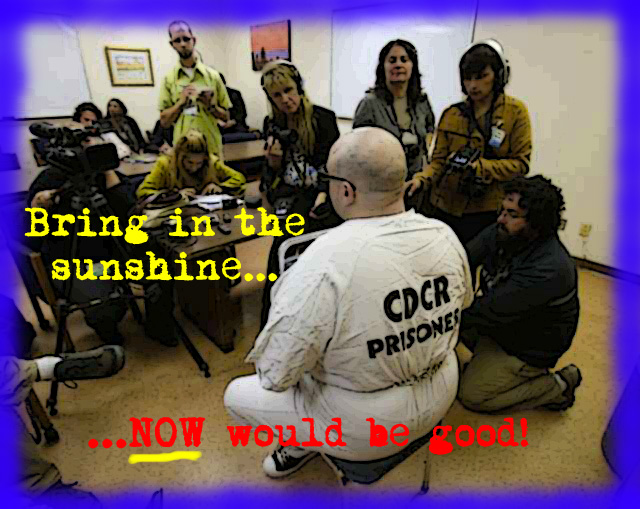CALIFORNIA LAWMAKERS MAY VOTE TO GIVE MEDIA MORE PRISON ACCESS (IT’S ABOUT TIME)
A controversial new California bill, if passed, would rescind the 1996 ban on in-person interviews of inmates by the media. The purported intent of the ban was to keep inmates from promoting themselves and attaining celebrity status, it has actually served to shield areas of the corrections system that need serious reform from public scrutiny.
This LA Times editorial has the details. Here’s a clip:
Under court order, the state is finally addressing the overcrowding problem by sending newly convicted nonviolent offenders to county detention facilities. But there are indicators that inhumane conditions persist; hunger strikes have arisen to protest the state’s use of Security Housing Units, where suspected gang members are isolated in tiny cells under solitary conditions that psychologists consider mentally destabilizing. Some inmates have been warehoused in these units for decades.
How bad is the situation? In truth, we don’t really know, because inmates in these units have no visitation, telephone or interview privileges. A much-needed bill by Assemblyman Tom Ammiano (D-San Francisco) would change that.
AB 1270 allows the media to request interviews with California inmates, including those in Security Housing Units. Officials at the Department of Corrections and Rehabilitation could still turn down these requests for reasons such as excessive risk to the reporter or prison guards, but they would have to submit a written explanation for such denials.
KPCC Air Talk’s Larry Mantle interviews Julie Small, KPCC’s Sacramento Reporter, and Jim Ewert, California Newspaper Publishers Association and General Counsel and Legislative Advocate on the issue.
SCHOOL POLICE STILL WRITE TOO MANY TICKETS FOR MINORITY KIDS, SAYS STUDY
The non-profit Center for Public Integrity has compiled data pointing to the fact that not only did LAUSD school police write an excessive number of tickets for African American and Latino students in 2011, but that 40% of those tickets were for kids under the age of 14. There were 438 citations given to middle-school-aged African Americans, 1394 citations given to Latinos, and 28 given to all other ethnicities for things like tardiness, vandalism, and disturbing the peace.
KPCC’s The Madeline Brand Show addresses the issue. Here’s a clip:
The district recently reported that during the last three years school police issued more than 33,000 tickets for alleged violations like vandalism, tardiness, and disturbing the peace.
The non-profit Center for Public Integrity is one of several groups compiling data about school policing throughout the country. It reviewed L.A. Unified’s numbers and found that 40 percent of those tickets went to kids 14 and younger — mostly middle schoolers.
The Center also found that school police wrote an overwhelming number of tickets at schools with large numbers of Latino and African-American students.
ALTERNATIVE HIGH SCHOOL GIRL PROFILES PEERS WHO’VE BEEN LOCKED UP
Through the Youth Justice Coalition’s Free L.A. High School, Claudia Gomez interviews students who have been incarcerated to shed light on juvenile corrections and those youth that have come out on the other side.
The California Story’s Jake de Grazia interviews Claudia Gomez about her work at Free L.A. Here’s a clip from the introduction, but the entire interview is extremely worthwhile:
South Los Angeles has a long history of feeding California’s overflowing prisons. And for a school that accepts previously incarcerated youth, the goal is to prevent young people from flowing back in. This is the story of a young woman who wants to make change through intimate conversations widely broadcast.
Here’s an excerpt from the Youth Justice Coalition’s Free L.A. site:
FreeLA High School, a partnership between the John Muir Charter School, the Youth Justice Coalition and the Workforce Investment Act, is dedicated to helping young people earn a high school diploma and find work with a focus on careers in social justice movement building. We serve 16-24 year olds based on their probation requirements and difficulty enrolling in other schools. Most of our students have been pushed out of several other high schools before coming to FreeLA, including Probation School or Los Angeles County Education programs within juvenile facilities.


Taylor- When you say the “purported intent of the ban was to keep inmates from promoting themselves and attaining celebrity status” but “actually served to shield areas of the corrections system that need serious reform from public scrutiny”, are you saying the ban did not keep inmates from promoting themselves and attaining celebrity status? Or that an unintended consequence of the policy was a lack of transparency? It seems to me you’ve structured the sentence to make the two ends mutually exclusive when they may not in fact be. It seems to me we still don’t want convicts becoming celebrities (especially in California, where we do love our celebrities and celebrity criminals) and we may not necessarily want to throw the baby out with the bathwater. – An LASD Deputy
“SCHOOL POLICE STILL WRITE TOO MANY TICKETS FOR MINORITY KIDS, SAYS STUDY”
It’s not “too many” if the tickets are justified.
Re-write it to say, “Too many minority kids violate school rules and society’s social contract for conduct.”
Oh, did you notice, too, that “too many” tickets are given to males? Wonder why.
Reiterating:
If so-called parents would properly do their freaking jobs, this wouldn’t even be an issue… So typical of modern society to b1tch and moan about the negative ramifications of improper behavior rather than focus on recognizing that improper behavior was the reason for the negative ramifications to begin with… Parents, YOU need to instill good morals, values, and behavior into your kids! (which may mean that YOU may need to learn, acquire, or exemplify some good morals and values and behaviors First!)